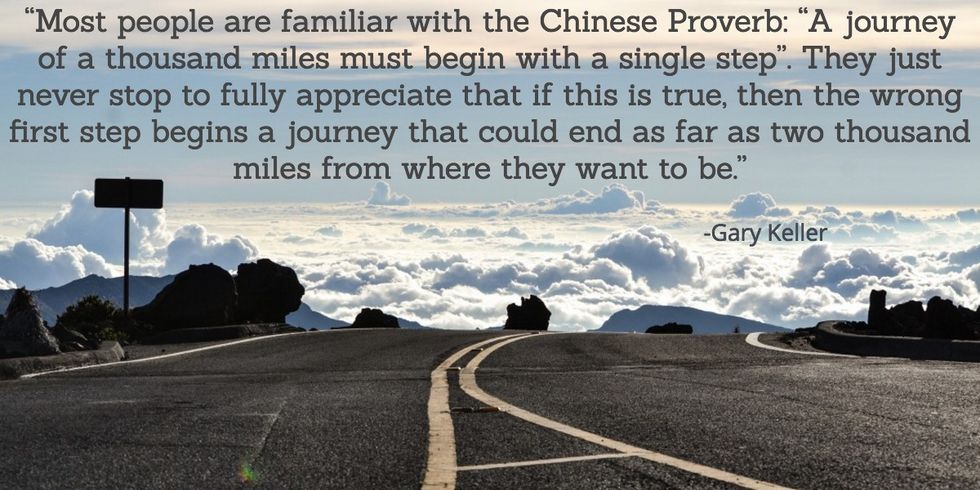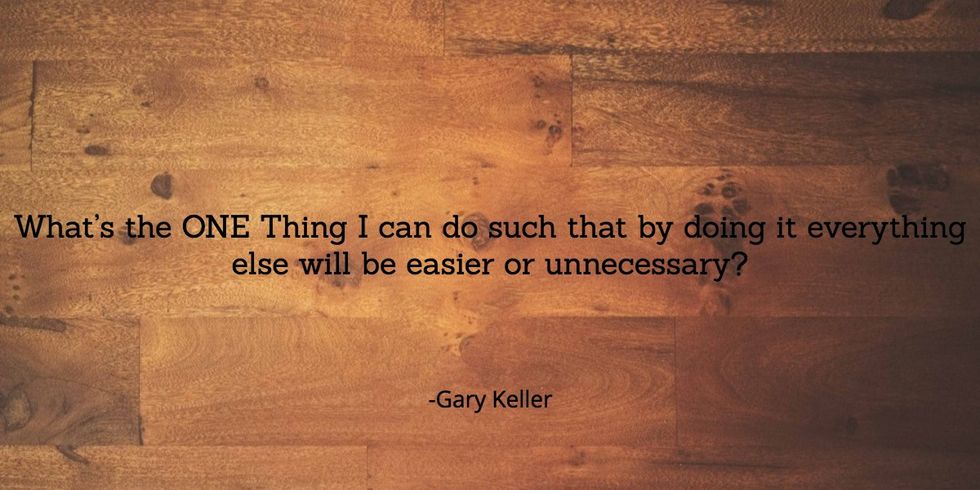…And for three easy installments of $39.99, you will receive…
You see what’s coming next? The motivation industry is typically divided into two different camps: the traditional model that sends a free 2 min preview then asks viewers to order the whole DVD, or the more modern style of submitting free videos on YouTube that pumps people up with quotes and movie scenes but doesn’t deal any lasting change to an individual’s goals.
Most viewers have been weathered to refrain from motivational texts and media because it tends to lead to a surge of dopamine with no end result on a person’s progress to a happier and more fulfilling life. This turns people away from texts and people that can aid in goal setting and success: a small group of speakers and authors that try to change the industry by making it less involved with making people happy with making people actually successful.
This group is hard to find. After going through over 25 books in the self-help genre and listening to dozens of speakers, I found only a few that left a lasting impact on me (and really with only nuggets of wisdom in each). However, when putting individual advice together, these influencers can have a lasting impact on setting and achieving your goals.
The first step to success always has to do with planning. Finding the right goal can be difficult, and sticking to it can be hard when all you have is a fuzzy idea of how you will achieve it. I’ll be referring to a handful of books and writers that I could not delve deeper into in one post, but each has little bits of information that builds on one another. They have dozens of great ideas and practices and refer to plenty of examples of successful people and businesses to back up both quantitative and qualitative data. From Bill Gates to Alcoa to Southwest to Michael Phelps, the evidence found is enough to at least consider their practices.
The benchmarks to aim for when it comes to setting goals are clarity and brevity. Saying “I want to lose weight, be a composer, and work on my 5 business ideas” can be a great image in your head (it certainly is when other people say you can do it), but as Kelly McGonigal PhD states in her book The Willpower Instinct: How Self-Control Works, Why It Matters, and What You Can Do To Get More of It when finding one of her students going relying on the motivation industry:
Goals need to be detailed because they need to be seen. Human beings have a prefrontal cortex that can contemplate what is yet to come, but it must be assisted with clarity. Goals also need to few in number. To be truly successful is to be phenomenal at a few traits, simply because there is not enough time to be great in everything. Attempting to be the “Jack of all Trades” just leaves you mediocre in a lot of different areas, as further elaborated in Gary Keller’s The One Thing: The Surprisingly Simple Truth Behind Extraordinary Results and echoed all the way back to Dale Carnegie’s How to Win Friends and Influence People. Finally, taking the time to lay out a plan is necessary for achieving what you want in life because the planning stage removes a lot of future doubt and stress. It can also save a lot of time, as Gary Keller explained:

- Write down what you want
- Reorganize
- Rate them
- Picking One from Each
- Separate your goal into three different subsections
- The ONE THING exercise
Go ahead, I'll wait….
Truth be told this is not a novel idea, and it’s just the beginning. The next few steps are discussed all across the internet by people who believe in the Law of Attraction, a belief that finds when people focus on positive or negative thoughts they bring positive or negative experiences into their lives. You can find it in LoA bloggers (my favorite being Stefan James from projectlifemastery.com) but you don’t have to be a full believer to start from the widest possible vantage. Having a list of what you want starts the process of narrowing down the specific goals you want for yourself. As a college student going into my junior year, I could use the help, so I’ll go first:
- To be published in a peer-reviewed journal article
- To run four Spartan races
- To get a 170 in the LSAT
- To make my student organization the best in the University of Southern California
- To get all A's this year
- To get accepted in a law firm for a summer internship
- To read the Quran more
- To win in competitive debate
- To save a lot of money in college
- To read 52 books and blog about them
- To run four Spartan races
- To make my student organization the best in the University of Southern California
- To get accepted in a law firm for a summer internship
- To run four Spartan races (8)(7)
- To make my student organization the best in the University of Southern California (6)(8) CHANGE
- To get accepted in a law firm for a summer internship (9)(9)
- Active- To run four Spartan races
- Professional- To get accepted in a law firm for a summer internship
- Personal- To read 52 books and blog about them
Go ahead and start big, we’ll get specific later.
There is a lot of stuff that we want in this world, but we need to narrow it down so that a goal can become achievable. This being said, it is a very radical move to narrow your goal to ONE THING. Gary Keller is correct in finding this to be an important step to success, but for students or anyone in a career that requires multiple areas of success, it can be very difficult to narrow it down to a single item. Start off small and arrange your goals to specific categories. Something along the lines of this:
Scholastic:
- To be published in a peer-reviewed journal article
- To get a 170 in the LSAT
- To get all A's this year
- To be published in peer-reviewed journal article (7)(6) CHANGE
- To get a 170 in the LSAT (6)(9) CHANGE
- To get all A's this year (8)(10)
- Scholastic- To get all A's this year
Active:
Professional:
Personal:
- To read the Quran more
- To win in competitive debate
- To save a lot of money in college
- To read 52 books and blog about them
- To read the Quran more (10)(5) CHANGE
- To win in competitive debate (6)(8) CHANGE
- To save a lot of money in college (6)(5) CHANGE
- To read 52 books and blog about them (7)(7)
This will prove useful later.
This trick is found in Stefan James blog and is great with filtering goals to become more manageable. First, put a number next to each item on your list on a scale from 0-10. The number will represent the level of BELIEF that you have that you will be able to manifest what you want within the next year. Next, put a second number next to each item on your list on a scale from 1-10. This number will represent the DESIRE you have for achieving this goal. Learn about yourself; find the real reasons behind you wanting these goals by asking yourself simple questions. The first can be “why?” or “why is this important to me? How does it affect the people around me? And what kind of person would I be following this goal under this desire?”
Scholastic
Active
Professional
Personal
Notice how some of them have the word CHANGE next to it? They transition perfectly into step.
Probably the hardest step in this situation. Narrowing it down to a single goal in different aspects of your life can remove a lot of the clutter. This doesn’t necessarily mean you ignore the other goals: you can change them to make them more manageable/desirable by doing research and finding out what you need to do, but at the same time visualize the benefits of doing them. If not, it could simply be something that you can put off for next year, or when you feel confident that you have reached some of your first goals. If it can’t wait, extensively plan on how you will tackle these goals in steps 5 and 6 and rely on it, almost like an autopilot for goals.
This simplest way to single them out is to find the goals with both the BELIEF and DESIRE numbers to be 7 or greater. If you don’t have that, then find the one with the closest median.
As explained by Charles Duhigg in his book Smarter Faster Better: The Secrets of Being Productive in Life and Business dividing a goal into a Stretch Goal, a SMART Goal, and a To-Do list can bring the specificity needed to bring the goal into vision. The Stretch Goals are our bigger and long-term goals (think of it as a combination of both your “why” and the vision you have of the person you become when you achieve the goal) that can supplement our SMART Goals - Specific, Measurable, Achievable, Relevant, Time-Boxed.
Keep your Stretch Goal in mind when making other SMART goals so that you approach the task with a singular focus.
To Get all A’s this year.
Stretch Goal- to aid in graduating summa or magna cum laude so that I will enter into a top law school that can set me on a career that can not only provide for my family but will later give me the ability to make meaningful change to the Muslim community in the U.S.
SMART GOAL (example)-
- Specific- Get A’s in my Macro Econ class
- Measurable- the grades I get throughout the semester and the hours I spend studying
- Achievable- it is in my power to getting good grades with each assignment
- Realistic- I can still get an A without getting an A in all of my homework and tests (ok, this is where the bargaining usually kicks in)
- Timeline- One Semester
Now the final subcategory has more to do with step
This is where Gary Keller’s Focus Question kicks in:
This exercise requires a lot of thinking and future planning. Let’s break down the question to see how it helps.
What’s the ONE thing I can do...
This not only asks of us to get out of our inactivity and commit to change but also focuses on one thing that we as individuals can do to create that change. Giving that kind of agency is important for those of us waiting for change to happen.
Such that by doing it...
Just because we’re out of inertia doesn’t mean we’re starting the thousand-mile journey the right way. This part asks us to only work on productivity, not busyness.
Everything else will be easier or unnecessary?
This adds to Duhigg’s insight on a keystone habit- a habit that will help influence other aspects of your life. For example, if a teenager wants to become fit, one good way to start is to take a cold shower every day. This encourages the kid to work up a sweat to need that shower. This is just a rudimentary way of answering the Focus Question.
Apply the SMART goal to the Focus Question. To make the goal even more specific, add timelines to this goal so that success doesn’t seem too far away. Breaking it down by saying “what is the One Thing I can do in the next year, next month, next week, etc…” can add a realness to the goal you thought was so far away. Finally, asking the question “what is the One Thing I can do RIGHT NOW…” is a question you can ask yourself constantly to gear your actions to attaining that goal on a daily basis.
A sample question may look like this:
What's the One thing I can do in the next semester to get an A in my Macro Economics class such that by doing it, everything else will be easier or unnecessary?
Find the answers to that question, modify the timeline, and then add the answers to your calendar on a reasonable level.
This is a rudimentary way to set goals that are both clear and focused, and this is a task that not many are good at. This plan is in no ways a replacement for hard work, but if you are just working for a goal that can’t be seen clearly, it may seem like you’re reinventing the wheel, a kind of attitude that will easily burn most of us out. This way, at least many of us can see the finish line.











































